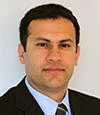Office of Research & Development |
 |
View: Recent Awards || All Awards
The Presidential Early Career Award for Scientists and Engineers (PECASE) is the highest honor conferred by the U.S. government upon federal researchers in the early stages of their careers. Four VA researchers were among the 102 recipients honored by the White House at a ceremony held in Washington, DC, on April 14, 2014.
 Karunesh Ganguly,
,
M.D., Ph.D.
Karunesh Ganguly,
,
M.D., Ph.D.
Research Scientist, Staff Physician, San Francisco VA Medical Center
Dr. Karunesh Ganguly was honored for his work on the critical interplay between neural learning and machine learning. His efforts to develop brain-machine interfaces (BMIs) that enable skilled control of prosthetics will improve the function and quality of life of Veterans and others with permanent disabilities following spinal cord injury, stroke, or amputation. His work has significantly advanced the field of neural engineering, and he has worked diligently to help establish guiding principles on how best to develop a stable brain-machine interface. Additionally, Dr. Ganguly is inspiring future generations of researchers who want to develop treatments for neurological disorders. In addition to his research and teaching duties, Dr. Ganguly is a practicing physician with the San Francisco VAMC's neurology and rehabilitation service, where he established a new interdisciplinary clinic for Veterans with gait and balance problems.
To learn more about Dr. Ganguly and his work, see:
Ganguly : "The need for new methods to restore function has become especially clear through my clinical work with veterans with a range of motor and cognitive disabilities. My interest in developing clinically viable brain-machine interfaces (BMIs) grew out of this experience and my past research in systems neuroscience and neural engineering."
 Brian Head, M.D., Ph.D.
Brian Head, M.D., Ph.D.
Research Health Scientist, VA San Diego Healthcare System
Because of Dr. Brian Head, medical science is that much closer to gene therapies that offer great promise for those with neurodegenerative disorders such as Alzheimer's disease, patients recovering from stroke, and Veterans with traumatic brain injury. Dr. Head has independently developed a highly innovative multidisciplinary research program focused on gene therapy for central nervous system repair. He has also helped spearhead work on a gene therapy to alleviate complications associated with stroke, dementia, TBI, Alzheimer's disease, and, potentially, depression. Dr. Head is also mentor and teacher to aspiring biomedical scientists at all education levels, including high school, college, and graduate students, as well as postdoctoral fellows and residents.
To learn more about Dr. Head and his work see:
Head: "From a young age I have always been fascinated and intrigued by the biological cell. Although I was trained as a basic scientist, my mindset changed drastically when I started to work for the VA hospital in San Diego. Every day working at the VA instills in me the drive and passion to contribute something positive back to these men and women who have sacrificed so much for our society and country. Any positive intervention that can place them back on their feet and improve their daily lives, whether at work or in their homes, should be the ultimate goal of every basic scientist and biomedical researcher."
 Katherine M. Iverson, Ph.D.
Katherine M. Iverson, Ph.D.
Clinical Research Psychologist, VA Boston Healthcare System
Every minute, another 24 Americans become victims of intimate partner violence (IPV). Although not solely a women's health issue, IPV exposure among women is a growing public health problem. And with women Veterans more likely than women civilians to experience IPV in their lifetime, IPV screening has become an important issue for VA health care. Thanks to Dr. Katherine Iverson, VA is one step closer to making IPV screening a routine part of care. Her studies examining the clinical importance of IPV screening have not only raised awareness about IPV's emotional and physical toll, they have provided a foundation for better detection and earlier treatment. In addition to her work with survivors of domestic violence, Dr. Iverson has also conducted research in the related area of traumatic brain injury.
To learn more about Dr. Iverson and her work, see:
Iverson: "Women and men who have served in the military possess many strengths that help them recover from very stressful events. I am honored to work with Veterans and their family members to promote safe and healthy intimate relationships. I draw inspiration for my research from the stories they share with me."
 Hardeep Singh, M.D., M.P.H.
Hardeep Singh, M.D., M.P.H.
Chief, Health Policy, Quality & Informatics—Center for Innovations in Quality, Effectiveness and Safety
Director, VA Center of Inquiry to Improve Patient Safety through Effective Electronic Communication, Michael E. DeBakey VA Medical Center
Just as VA pioneered the electronic medical record (EMR), Dr. Hardeep Singh has been pioneering ways to use data from that EMR to improve patient safety and healthcare quality. In addition to developing novel methods for reducing diagnostic errors by alerting health professionals to abnormal test results, he has worked toward improved detection and understanding of patient safety issues in the VA outpatient setting. His work focuses on understanding and reducing diagnostic errors in the ambulatory care setting (especially those that involve missed and delayed cancer diagnosis); use of health information technology to identify and reduce diagnostic errors; and patient safety related to the implementation and use of the VA's electronic health record. Dr. Singh is also principal investigator for a study that will evaluate the accuracy of a "real-time" automated surveillance system to identify Veterans at risk for missed or delayed diagnosis of common cancers.
To learn more about Dr. Singh and his work, see:
Singh: "Much remains to be done to improve patient safety related to diagnosis in medicine. So I think advancing and contributing to a research agenda for a topic so fundamentally important is one of the reasons I became a researcher. Another is using science to make an impact on policy and practice of health care."